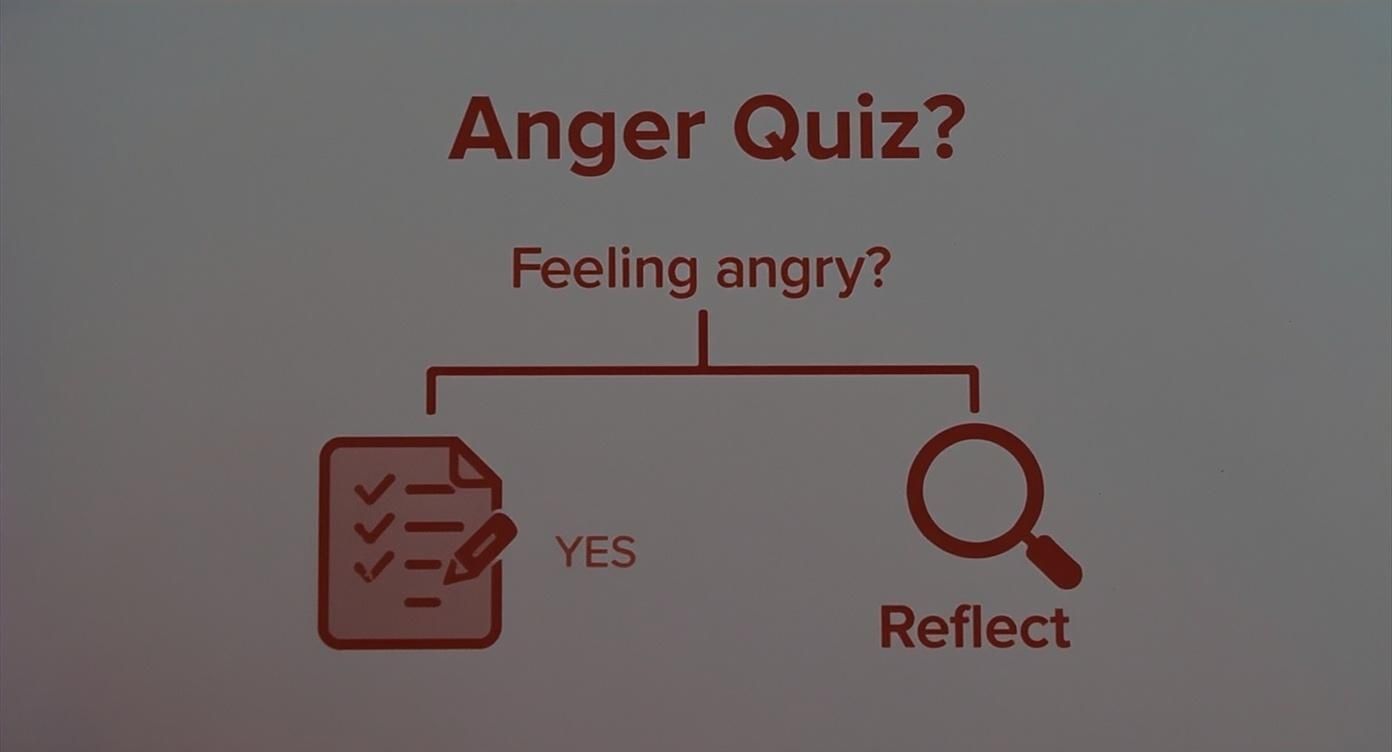Ever found yourself wondering if your reaction to a small frustration was a little… much? This anger issues quiz is designed as a starting point for self-discovery, helping you explore whether your emotional responses are just a bad mood or a sign of something deeper. Think of it as a tool for gaining clarity, not a diagnosis.
Is It More Than Just a Bad Mood?

We've all been there. That moment when a minor annoyance makes you boil over can be unsettling, leaving you questioning if your anger is normal. The truth is, anger itself isn’t bad. It’s a natural, healthy human emotion that signals when a boundary has been crossed or a need isn't being met. It’s your internal alarm system.
But there's a big difference between a healthy emotional response and problematic anger that complicates your relationships, career, and overall well-being. Imagine your anger exists on a spectrum. On one end, you have fleeting irritation—like when you spill your coffee. On the other end are disruptive, explosive outbursts that feel uncontrollable and have real-world consequences.
Understanding the Spectrum of Anger
The key is learning to tell the difference. Healthy anger is usually proportional to the situation, is expressed assertively (not aggressively), and pushes you toward a resolution. Problematic anger, on the other hand, looks and feels very different.
To help you see where your own experiences might fall, here's a quick comparison.
Healthy Anger vs Problematic Anger at a Glance
| Characteristic | Healthy Anger | Problematic Anger |
|---|---|---|
| Intensity | Proportional to the situation. | Over-the-top reactions to minor triggers. |
| Frequency | Occasional, in response to specific events. | Frequent; feeling angry or on edge most days. |
| Duration | Fades after the issue is addressed. | Lingers long after the event has passed. |
| Control | You feel in control of your actions. | Feels uncontrollable, leading to outbursts. |
| Expression | Assertive communication, problem-solving. | Aggression, yelling, passive-aggression. |
| Impact | Leads to resolution and stronger boundaries. | Harms relationships, causes legal or work trouble. |
Seeing the patterns side-by-side can make it easier to contextualize your feelings and behaviors.
This distinction is crucial because unchecked, problematic anger can become a default response, hardwiring your brain to react intensely without a second thought. For neurodivergent individuals, this can be even more pronounced; you can learn more about how adults with ADHD manage emotions in our detailed guide.
This anger issues quiz isn't about getting a simple 'yes' or 'no' answer. It's meant to be a mirror, reflecting your emotional patterns back to you. By answering honestly, you can start to see your behaviors more clearly. Consider this your first step toward understanding—and empowering yourself with the clarity needed to feel back in control.
Take Our Comprehensive Anger Issues Quiz
This is a chance for some honest self-reflection. Our 20-question anger issues quiz is designed to help you get a clearer picture of your emotional responses in different situations. You won't find any judgment here—just straightforward questions based on common behavioral patterns related to anger.
Think of this less like a test and more like a mirror. The goal is simply to reflect your own patterns back to you, helping you see things you might have missed. It's an opportunity to take a personal inventory of how anger is showing up in your life.
How to Take the Quiz
For each statement below, pick the number that best describes how often you've felt or behaved this way over the past month. The real value here comes from being honest with yourself.
Use this simple scale for your answers:
- 1 – Never
- 2 – Rarely
- 3 – Sometimes
- 4 – Often
- 5 – Always
Just jot down the number for each answer. We’ll walk through how to score your results and what they might mean in the next section.
Your Self-Assessment Questions
- I find myself getting irritated by small, insignificant things.
- When I'm angry, I feel my heart race, my muscles tense, or my face flush.
- I have trouble calming down once I feel angry.
- I say things I later regret when I'm upset.
- My anger feels intense and overwhelming, like it takes control of me.
- I hold onto grudges for a long time.
- Others have told me that I have a short temper or seem angry often.
- I use sarcasm or passive-aggressive comments to express my frustration.
- I have raised my voice, yelled, or slammed doors when angry.
- I feel a sense of guilt or shame after an angry outburst.
- My work or school performance has been affected by my anger.
- I find myself replaying frustrating events over and over in my head.
- I avoid situations or people because I'm afraid I might get angry.
- My relationships with family, friends, or partners have been strained due to my anger.
- I feel defensive or personally attacked during disagreements.
- I have engaged in risky behaviors (like reckless driving) when I’m angry.
- I find it difficult to express my feelings calmly and constructively.
- I turn to substances like alcohol to cope with angry feelings.
- I have physically broken or thrown objects out of frustration.
- I feel constantly on edge or irritable, even when nothing is wrong.
A Note on Self-Reflection: As you go through the questions, pay attention to which ones really hit home. Sometimes, a single statement can shine a light on a recurring pattern you hadn't fully recognized before.
Once you’ve answered all 20 questions, just take a moment. The next step is adding up your score to understand what it might suggest about your emotional patterns. This quiz is a private tool for you, so give yourself credit for taking this important step. Now, let’s find out what your results mean.
What Your Quiz Score Actually Means
Getting your quiz results back can feel like a lightbulb moment. Your score isn't a label or a formal diagnosis. Think of it more like a compass, giving you a personalized snapshot of your emotional patterns and pointing you toward a deeper understanding of how you react to stress and frustration.
It’s a powerful tool for self-reflection, and you’re not alone in exploring this. Difficulty with anger is far more common than most people think. Research shows that roughly 7% to 11% of the general population deals with significant anger problems, and about 30% admit they struggle to control their temper. Knowing this can help normalize what you’re feeling and empower you to figure out what's next. If you're interested in the data, you can explore detailed anger statistics on Crown Counseling.
This visual can help you map out your next move based on how you're feeling right now.
This decision tree shows a simple path forward: acknowledging your feelings and taking proactive steps—like using a quiz for self-reflection—to move in a healthier direction.
Interpreting Your Score Range
So, what does your number actually suggest? We’ve broken down the scores into three tiers to give you a clear, practical interpretation of your results. Each one offers insight and suggests some potential next steps on your journey.
-
Low Concern (20-45 points)
A score in this range suggests you generally have a healthy relationship with anger. You likely feel frustration from time to time but can express it constructively without it messing with your life or relationships. It's a great sign that your current coping skills are working well. -
Moderate Concern (46-70 points)
If your score landed here, it might be an indication that anger is causing some noticeable issues. Maybe you find yourself getting irritated often, having reactions that feel too intense for the situation, or feeling a strain on your relationships. This is a clear signal to start exploring new anger management techniques and figuring out what your triggers are. -
High Concern (71-100 points)
A score in this upper range is a strong indicator that anger is creating significant distress and disruption in your life. It might feel overwhelming and out of your control, potentially harming your relationships, career, and overall well-being. At this level, seeking professional guidance from a therapist is a highly recommended and empowering step to take.
Remember, a higher score isn't a sign of failure. It's a sign of awareness. Recognizing these patterns is the first—and most important—step toward making a positive change.
No matter where your score landed, you now have more clarity. This isn't the end of the journey; it’s the beginning of a more informed path forward. You can use this insight to build on your strengths or find support to develop new ones. The goal is to feel in control of your emotions, not controlled by them.
Uncovering the Hidden Signs of Anger
Anger doesn't always roar; sometimes, it whispers. While explosive outbursts are easy to spot, many expressions of anger are so subtle they're easily mistaken for personality quirks or just a bad day. Recognizing these hidden signs is a critical first step in understanding your emotional world, especially if your anger issues quiz results were a surprise.
Think of problematic anger like an iceberg. The yelling and obvious frustration are just the tip you can see above the water. Beneath the surface, there's a much larger, hidden mass of suppressed feelings that can show up in passive, indirect, and even physical ways. Over time, these less obvious signs can be just as damaging to your relationships and well-being.
Beyond the Outburst: Passive and Physical Symptoms
When anger gets turned inward or has to find a sideways route out, it can wear some convincing disguises. Societal expectations often pressure people—especially women and individuals in BIPOC communities—to swallow their anger. This doesn't make it disappear; it just forces it to surface in more "acceptable" but equally harmful ways.
You might be dealing with hidden anger if you frequently experience:
- Chronic Sarcasm or Cynicism: Constantly using biting humor or a persistently negative outlook is often a way to express dissatisfaction without a direct confrontation.
- The Silent Treatment: Withdrawing communication and affection is a powerful, passive way to punish someone, creating emotional distance instead of resolving conflict.
- Excessive People-Pleasing: Always putting your own needs on the back burner to avoid rocking the boat can lead to a slow-simmering resentment that eventually boils over.
- Unexplained Physical Ailments: Suppressed anger has to go somewhere. It can manifest physically as chronic headaches, digestive issues, high blood pressure, or persistent muscle tension.
This internal pressure cooker effect means that unexpressed anger doesn't just vanish. It finds other outlets, often leaking out in ways that slowly erode your mental health and relationships without a single shout.
How Anger Hides in Plain Sight
Anger is an expert at camouflage. It can look like anxiety, depression, or even apathy. To help you spot it, we've put together a table of some common masked behaviors and the angry feelings that might be driving them.
Hidden Manifestations of Anger
This table reveals less obvious ways anger can surface, helping you identify behaviors in yourself or others that you might not typically associate with anger issues.
| Masked Behavior | Underlying Anger Driver | Common Example |
|---|---|---|
| Constant Joking/Sarcasm | Feeling unheard or powerless; wanting to express frustration without direct conflict. | Making a "joke" about a partner's annoying habit instead of discussing it openly. |
| Procrastination | Resentment toward the task or the person who assigned it; a form of passive resistance. | Repeatedly "forgetting" to do a chore you feel is unfair. |
| Chronic Lateness | Passive defiance; asserting control when feeling controlled by others' schedules. | Consistently showing up late to family gatherings you feel obligated to attend. |
| Gossip or Sabotage | Inability to confront someone directly; trying to regain a sense of power or justice. | Spreading rumors about a coworker who got a promotion you believe you deserved. |
| Apathy or Detachment | Feeling overwhelmed and hopeless; shutting down emotionally as a defense mechanism. | Responding with "I don't care" when asked for your opinion on important decisions. |
Recognizing these patterns requires looking at the why behind the behavior. Is your constant joking a way to deflect from real frustration? Is your need to keep the peace causing you to bottle up resentment? Answering these questions honestly can reveal how anger might be influencing your life from the shadows, giving you a much more complete picture of your emotional health.
Understanding the Roots of Your Anger
If you want to get a handle on your anger, you first have to understand where it’s coming from.
I often ask my clients to picture their emotional resilience as a bucket. Every little stressor—a frustrating email from your boss, getting stuck in traffic, a small disagreement with your partner—adds a little more water. On their own, they’re just minor annoyances. But day after day, they fill that bucket until one tiny, final drop makes the whole thing overflow.
This “stress bucket” effect is why you might suddenly explode over something that seems completely trivial. Your reaction isn't really about the wet towel on the floor; it's about the accumulated weight of everything else you've been carrying. Those triggers can be deeply rooted in past experiences, learned family dynamics where yelling was the norm, or just the relentless pressure of chronic stress that wears everyone’s fuse down.
And it’s not just you. Widespread emotional distress has been climbing. Between 2009 and 2021, feelings of global emotional distress jumped from 25% to 31%. That’s a significant rise, and it shows just how much modern life is filling our collective stress buckets. You can read the full research on rising emotional distress on PNAS.org for a deeper look.
Neurodiversity and Emotional Regulation
For some of us, the brain's own wiring plays a huge part. In neurodivergent people, especially those with ADHD, emotional dysregulation is often a core, built-in challenge. The brain's executive functions—the part that’s supposed to act like a braking system for intense feelings and impulses—just works differently.
This can make emotions feel like a flash flood. They come on suddenly, with incredible intensity, and feel almost impossible to contain. It’s not a character flaw or a lack of willpower; it’s a neurological difference in how the brain processes and manages emotions. Taking a moment to understand the link between anger and ADHD can be a game-changer and a huge step toward self-compassion.
Approaching your anger with this kind of understanding is key. Instead of criticizing yourself for feeling so intensely, you can start to investigate the root causes with genuine curiosity. This shift in perspective is the first real step toward finding effective, lasting strategies for managing how you respond.
Practical Ways to Manage Anger Starting Today
Understanding why you get angry is the first step. Learning what to do about it is where the real change happens. The goal isn't to get rid of anger entirely—it's a perfectly normal human emotion, after all. It’s about learning to respond to it in healthier, more constructive ways.
This is where tools from Cognitive Behavioral Therapy (CBT) come in handy. CBT is a practical, evidence-based approach that helps you get to the root of your anger by examining the thoughts that fuel it.
Think of yourself as a detective for your own mind. CBT teaches you to spot and challenge those automatic negative thoughts before they escalate. So instead of letting a thought like, "This traffic is going to ruin my entire day!" take the driver's seat, you learn to consciously reframe it.
A simple reframe might sound like this: "Okay, this delay is frustrating, but it's temporary. I can handle it and still have a good day." That small shift does something powerful—it interrupts the anger cycle. It creates a crucial pause, giving you back the power to choose your response instead of just reacting.
Create Your Personal Calm-Down Plan
One of the most effective things you can do is have a game plan ready for when you feel that heat rising. This "calm-down plan" acts like your own emotional first-aid kit. A core part of this is developing healthy coping mechanisms for stress, which are foundational for emotional regulation.
Your plan should be simple and easy to remember in the moment. Here's a framework:
- Step 1: The Pause. The second you feel the anger building, just stop. Take three deep, slow breaths. This isn’t just a cliché; it actually kicks in your body’s relaxation response.
- Step 2: The Self-Talk. Have a go-to calming phrase ready. Something simple like, "I am in control," or "This feeling will pass."
- Step 3: The Action. Physically change your environment, even for just a few minutes. Step outside, put on a song, or splash some cold water on your face.
This isn't about raw willpower. It's about building a structured, practiced routine that your brain can default to when emotions run high.
While most of us learn to manage daily frustrations, for some, anger can become a clinical issue. Intermittent Explosive Disorder (IED), which involves recurrent, impulsive anger outbursts, has a lifetime prevalence of about 0.8% globally. You can learn more about these clinical findings at NCBI.
By figuring out your triggers and practicing these techniques, you start building emotional resilience. To take a deeper dive, our free CBT workbook offers structured exercises to help turn these ideas into real-world habits. You can download it here: https://sachscenter.com/cbt-workbook-pdf/
A Few Common Questions About Anger
After digging into your own patterns with our quiz, it's natural to have more questions bubbling up. Let's tackle some of the most common ones we hear from clients to give you a bit more clarity.
Can an Online Quiz Really Diagnose Anger Issues?
It’s best to think of this anger issues quiz as a self-reflection tool, not a formal diagnosis. See it as a helpful starting point—a way to gain some personal insight into your emotional patterns and see if there’s something worth exploring further.
But no, it is not a substitute for a professional evaluation. A real diagnosis can only come from a qualified mental health provider who takes the time to understand your full history and context through a comprehensive assessment.
What’s the Difference Between Anger and Aggression?
This is a really important distinction. Anger is a normal, valid human emotion—it's just a feeling. Aggression, on the other hand, is a behavior.
You can feel white-hot angry without ever acting aggressively. The feeling itself isn’t the problem. It’s the destructive actions that aggression can lead to—like screaming at someone, punching a wall, or getting into physical fights—that cause real harm to you and the people you care about.
Getting clear on this difference is the first step toward managing your responses in a healthier way.
How Does Therapy for Anger Actually Work?
Therapy isn't about a professional just telling you to "calm down." It’s a supportive, structured process where you learn to understand and manage anger for yourself. A good therapist will work with you to:
- Pinpoint Your Triggers: Figure out the specific situations, thoughts, or even physical sensations that set your anger off.
- Build a Coping Toolkit: Learn practical, in-the-moment techniques (like those from CBT or mindfulness) to get a handle on your emotions before they boil over.
- Get to the Root Cause: Often, intense anger is fueled by something deeper, like past trauma, chronic stress, or needs that aren't being met. Therapy helps you uncover and address these core issues.
- Learn Healthier Communication: Practice how to express your needs and frustrations assertively—not aggressively—to build stronger, more honest relationships.
Ultimately, therapy gives you the tools and self-awareness you need to navigate life's challenges with more control and confidence.
If your quiz results brought up some concerns, or if you're just ready to get a clearer picture of your emotional health, the Sachs Center is here to help. Our telehealth diagnostic evaluations for ADHD and Autism can give you the answers you're looking for, all from the comfort of your own home.
Explore our diagnostic services and book your evaluation today.


